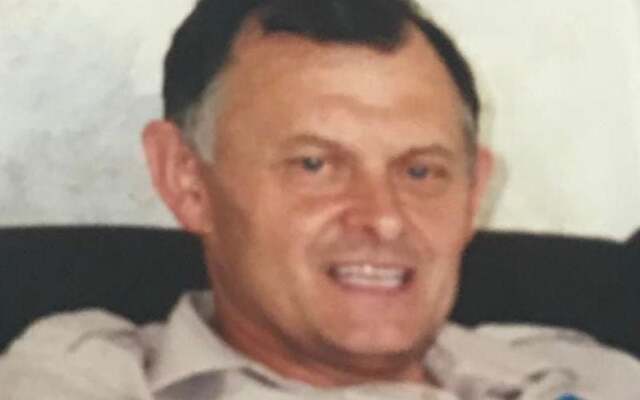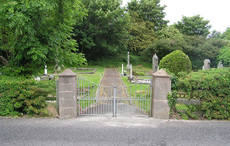In case after case, families of Troubles-victims have displayed unbreakable strength, fortitude, and determination in pursuing truth and justice.
No matter the obstacle, they remain committed to establishing a loved one’s innocence and clearing a loved one’s name, discovering who is accountable for causing a loved one’s death, or receiving acknowledgment for the loss.
In some cases (the Ballymurphy Massacre and the Bloody Sunday families are two examples), the pursuit has taken families decades. Driven by a deep well-spring of love, families carry on. They are truly amazing.
This article is about another one of those tragic cases - Sean Brown. According to Peadar Thompson’s moving book on GAA players killed during the Troubles, "Lost Gaels," Brown was chairperson of the Wolfe Tones GAA club in Bellaghy, Co Derry.
After meetings one evening in May 1997, he was locking the club’s gates when he was kidnapped, placed in the boot of his own car, driven away, and shot six times by members of the paramilitary Loyalist Volunteer Force (LVF).
No one has been prosecuted for this sectarian murder. Decades later, it was uncovered that state agents were among the more than 25 people linked by intelligence to his killing, placing the issue of collusion at the heart of the case.
Brown’s wife Bridie has been to court 58 times seeking the same thing any of us would want to know if a loved one of ours was brutally killed - “how, why, and by whom” was he killed?
For democracies, the coin of the realm is public trust. We rightfully expect public officials to uphold the rule of law and obey the law, not violate it.
The state has a duty to conduct an “effective investigation” into Brown’s death under Article 2 of the European Convention on Human Rights (ECHR). When the government fulfills its societal obligation to investigate and solve murder crimes, it acts in the public interest and bolsters public trust.
When the government sweeps such crimes under the rug, however, it harms the rule of law. By acting in a way that is contrary to public interest, the government diminishes public trust. Sadly, this is the status of Brown’s case. It has been swept under the rug for much too long.
When the police investigation into Brown’s murder closed in 1998, no one was charged. A 2004 Northern Ireland (NI) Police Ombudsman Report criticized the police for failing to search for witnesses, make attempts to identify vehicles, conduct a proper forensic analysis, and share available intelligence with the investigating team. In a word, the investigation was a “cover-up.”
Additionally, the first Inquest into Brown’s death was forced to shut down when state agencies failed to comply with disclosure requirements. In a 2022 statement, the then NI Police Service (PSNI) Chief Constable issued an apology “to Mrs. Brown and her family for inadequacies in the RUC [police] original investigation.”
These are the kinds of obstacles many Troubles-victims’ families face in cases involving collusion.
The Brown family, however, refused to give up. After years of court battles, there was a second Inquest. Evidence showed that 25 people were linked to Brown’s murder, including several state agents. But that Inquest was forced to close last year.
Coroner Patrick Kinney felt the state’s delay in producing documents and its failure to comply with its statutory disclosure obligations were so severe, that he questioned whether there was a concerted effort to prevent the Inquest from discovering the truth. Because the government redacted so much information from files it deemed sensitive on national security grounds, it became clear to the coroner that he would be unable to conduct an effective investigation.
Due to the “many hundreds of redactions,” the coroner concluded continuing an Inquest that would be “incomplete, inadequate, and misleading” would cause “further pain and anguish” for the Brown family.
He was able to rule that Sean Brown was an “entirely innocent man” who was executed by LVF gunmen.
The coroner stated that “my duty to carry out a full, fair, and fearless investigation into Mr. Brown’s death is seriously compromised as issues of central importance to the death cannot be dealt with by the Inquest process.”
As a result, he recommended that “a public inquiry be established into the death of Sean Brown, which would allow the sensitive material to be examined and tested in a closed hearing.”
Current PSNI Chief Constable Jon Boutcher publicly expressed agreement with the recommendation. The Secretary of State of Northern Ireland (SOSNI) Hilary Benn, however, rejected the recommendation and called upon the Brown family to bring their case to the Independent Commission for Reconciliation and Information Recovery (ICRIR).
In September, Northern Ireland's Court of Appeal found that the ICRIR process falls short of Article 2, ECHR requirements. Benn believes, however, that he can address this failure with new legislation that will make the ICRIR capable of fulfilling the government’s human rights obligations. He has not yet introduced a bill or presented language that might accomplish this. Meanwhile, the government remains in “continuing breach of its Article 2 obligation” to properly investigate Brown’s murder.
Moreover, in a meeting with the SOSNI, the Brown family told Benn that they “will never engage with the ICRIR.” Like many Troubles-victims’ families, they do not trust that the ICRIR process will deliver the truth. Due to the SOSNI’s decision ruling out a public inquiry, Bridie Brown returned to court for relief.
Now there is reason to believe that the Brown family’s long truth-seeking journey may move forward along a new path. Last December, NI High Court Judge Michael Humphreys determined that there is “only one lawful answer” to the question of how to conduct a human rights-compliant investigation into the 1997 murder of Sean Brown. The answer is “a public inquiry must be convened” by the SOSNI.
When the government appealed the High Court decision, the family responded by saying, “[w]e’ll keep pushing to get to the answers.”
This month, in an opinion delivered by Lady Chief Justice Siobhan Keegan, the NI Court of Appeals upheld the High Court determination and ruled an “independent public investigation must be held without further delay.” The Court said the ICRIR “is not fit for the purpose in Mrs. Brown’s case,” and nothing other than a public inquiry can satisfy the government’s duty.
Referring to the fact that there has not been a lawful investigation of Brown’s murder for more than 28 years “as a shocking state of affairs,” the Court gave the SOSNI four weeks to consider the judgment and comply with the Court’s order.
Brown’s family urged the SOSNI to “do the right thing!”
At a March Forum in Washington, DC, Boutcher said that Troubles-victims’ families “have been denied the truth for too long. The truth must be disclosed to them and the public.” I concur. The SOSNI should not delay in announcing that a public inquiry into Sean Brown’s death will be conducted.
Like all Troubles-victims’ families, the Brown family has a legal and moral right to know what happened. The government owes them the truth. Its importance for NI cannot be overstated.
As Professors Louise Mallinder and Anna Bryson of the George Mitchell Institute at Queen’s University have pointed out, “truth is a precondition to reconciliation.” (emphasis supplied).
This article was submitted to the IrishCentral contributors network by a member of the global Irish community. To become an IrishCentral contributor click here.




Comments